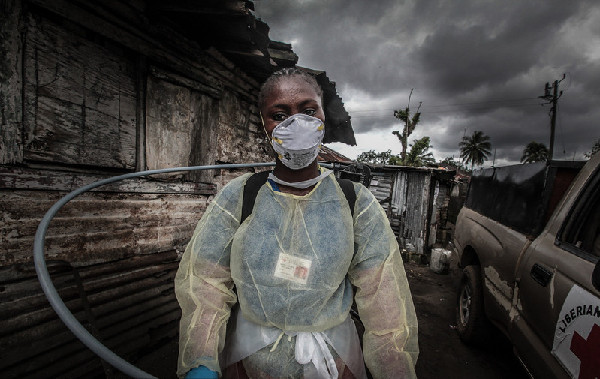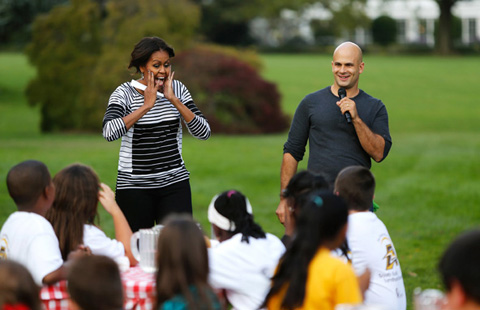Feature: Ebola body collection team in Monrovia
Updated: 2014-10-16 11:00
(Xinhua)
|
||||||||
MONROVIA, Liberia - Garmai Sumo watches her teammates as they pull a deceased Ebola victim out of a slum house in the Liberian capital of Monrovia. She holds a disinfectant wand in her hand and sprays her teammates as they come out and then sprays the ground.
 |
|
Liberian Red Cross "burial" team, in Monrovia, Liberia, on October 14, 2014. [Photo/IC] |
The day for body collectors begins at 8 am, when they arrive at the old Ministry of Health building in central Monrovia. They eat breakfast, have team meetings, and load into cars by 9 am.
The first stop on their Monday trip was in one of the slums in Monrovia, capital city of one of three West African countries hardest hit by Ebola. The epidemic is still spreading in Liberia, Guinea and Sierra Leone and projections show there could be between 5,000 and 10,000 new cases a week in early December, the World Health Organization (WHO) said on Tuesday.
The death toll so far in the latest outbreak, first reported in Guinea in March, has reached 4,447 from a total of 8,914 cases, WHO Assistant Director General Bruce Aylward said.
While the figures suggest a survival rate of 50 percent, they mask the true picture, Aylward said, adding that, "What we're finding is 70 percent mortality" in all three countries.
Upon the arrival at the slum, the body collection team hops out of the car, speaks to the family to get consent to remove the body, and then they begin to suit up.
Once they are in their suits, a team member with the sprayer, also known as the "First Man," begins spraying the door handle. After he is satisfied, another team member opens the door, and the sprayer is the first man inside.
He sprays the body as team members follow in a single file behind him. They lay the body bag on the ground and lift the body into it, and zip it up. The body is then carried with great care to a waiting pickup truck where it is again sprayed with disinfectant.
The process from when the first feet hit the ground to when the body is secured in the truck takes about 20 minutes. Disinfection is a protection for everyone from Ebola that spreads via the body fluids of patients, and can even be passed on by their corpses.
The team spends the next 30 minutes carefully disassembling their protective equipment. The disinfectant spray is on constantly as team members gather in a circle and one by one, with the whole team watching and giving instructions, remove gloves, mask, and finally body suit, then are disinfected by two sprayers. The equipment is stored in a black plastic trash bag that is put on the same pickup bed as the bodies.
The collection team is led by Roselyn Nugba-Ballah, who wears medical scrubs with popular American cartoon character Winnie the Pooh on them. In a country worst hit by the deadly disease, such a team is a temporary mixture.
"We have a mixture of people, some are professional nurses, some are medical practitioners, some are environment health technicians, and some are just high school students, some are college students, some are graduates. So it's a mix," she said.
The training is a full day long, and involves practicing with the protective equipment to build muscle memory so that team members get it right every single time. Once a person passes the training, they must first follow the team around and observe the operations.
Once the trainee has enough observation experience, they are paired up with the most experienced member of the team and given small tasks that increase in importance.
- Obama vows more aggressive response to Ebola fears
- West Africa needs $200m to fight Ebola
- 2nd Texas health worker gets Ebola
- Companies take Ebola precautions in Africa
- Obama holds Ebola meeting as WH defends handling of outbreak
- WHO: Ebola death rate rises to 70 percent
- Ebola-infected UN employee dies in Germany

 Li pledges stronger parliamentary exchanges with Italy
Li pledges stronger parliamentary exchanges with Italy
 Forbidden City art goes on display
Forbidden City art goes on display
 Photo Beijing 2014 kicked off
Photo Beijing 2014 kicked off
 Bilateral difficulties on manageable track
Bilateral difficulties on manageable track
 All eyes on White Cane Safety Day
All eyes on White Cane Safety Day
 Taiwan photographer depicts NYC on grand scale
Taiwan photographer depicts NYC on grand scale
 Premier Li meets director-general of UN FAO in Rome
Premier Li meets director-general of UN FAO in Rome
 White House also produces harvest joy
White House also produces harvest joy
Most Viewed
Editor's Picks

|

|

|

|

|

|
Today's Top News
Premier Li sows the seeds for farming
US CEOs wish trade treaty a priority
China singled out for 'important' role in Africa's development
Obama holds Ebola meeting
Exporters lower sights for sales at Canton Fair as woes persist
'Main course' still ahead, Li says
HK leader says protests hatched for more than year
Li pledges parliamentary exchanges with Italy
US Weekly

|

|







